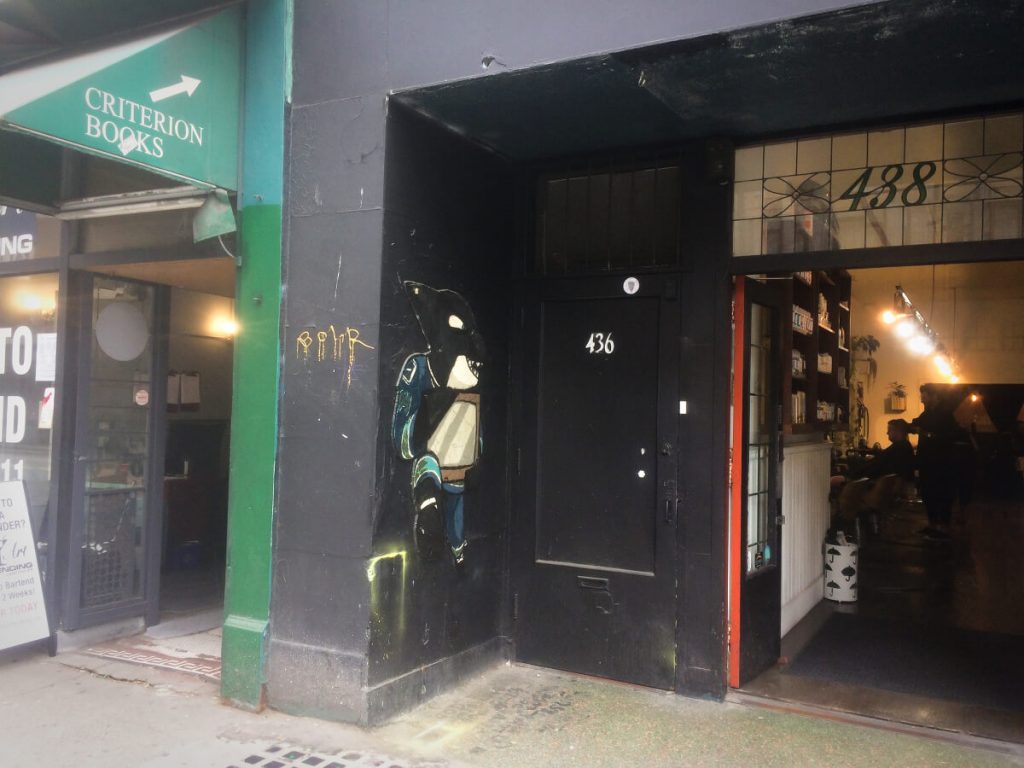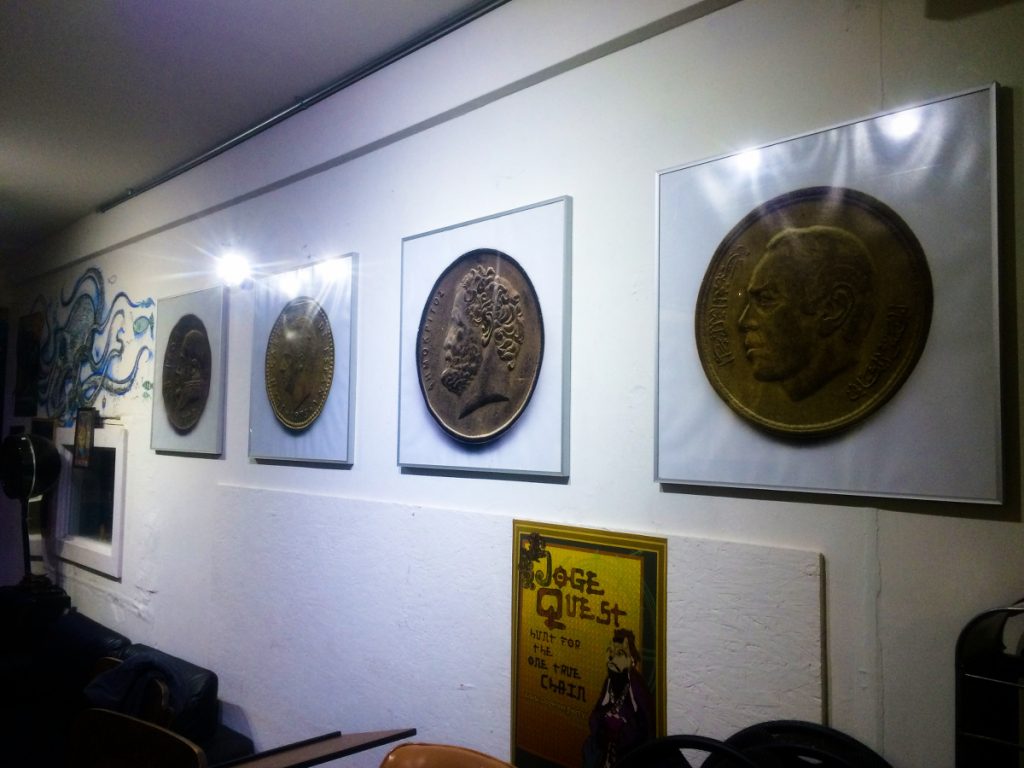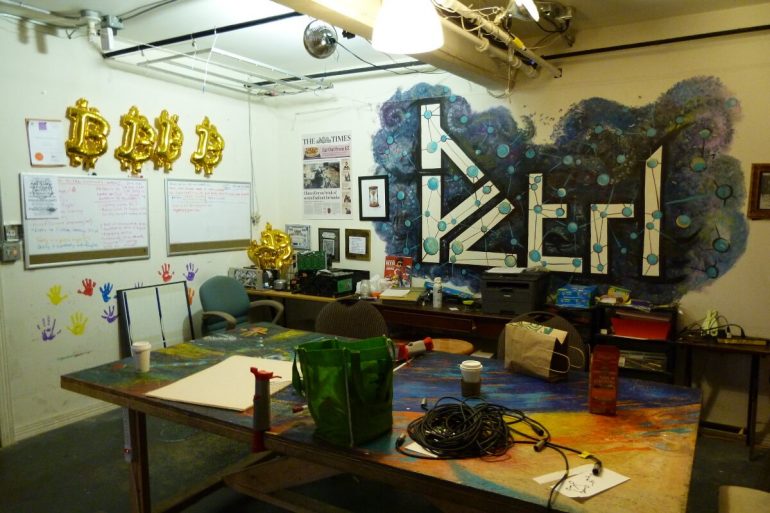On the corner of Pender and Richards streets in downtown Vancouver, an unmarked black door faces the traffic. Sandwiched between a second-hand bookstore and an old-style hair salon, it’s easy to miss. The building doesn’t have any signage, but–as regular visitors will point out–it doesn’t need it. Those who know about the space understand its significance.
Named DCTRL–pronounced “decontrol”–the location is a radical, artist-run basement that has acted as the crucible for the majority of the city’s blockchain companies. Local hacktivists debate ideas in a central room with well-worn, movable couches; congregate in a small jam space with a free-for-use keyboard and rudimentary soundproofing; and sit quietly in a separate, disorderly area earmarked for coding. The walls are covered with haphazard meme-related murals, and the washroom is marked with a sign that reads “cemetery.”
“I’ve been pushing that Vancouver will be the place that we really start respecting the user.”
The space, newcomers are told, is a do-ocracy: an organizational structure that lets individuals choose their own tasks independently. It’s part of the location’s aim to translate blockchain’s ideology of decentralization into the lives of its visitors. It’s also one of the reasons that Vancouver’s blockchain community is unique.
“What I like most about our spirit here at DCTRL is that it’s always been free, welcoming, and publicly accessible,” said Chelsea Palmer, an organizer at the space and co-founder of Carpe Lunem events association, a company that orchestrates blockchain-related activities in the city. “I get a bit bulldoggish about it, because I think that the private sector is riding on the wave of blockchain, and beginning to co-opt the technology. Because this basement space is so weird and special, we’ve avoided that. Anyone who cares more about money than people comes down here and never wants to return. We haven’t experienced what a lot of other spaces in blockchain have gone through, with Wall Street financiers coming in and taking charge. We are literally underground.”

It’s that protection, Palmer suggested, that has allowed the city to take a different approach to blockchain-based technologies. Many of Vancouver’s most prominent companies have roots in the community incubator, with a number of DCTRL’s regular members trading faded t-shirts for suits and startups. Local success story the Vanbex Group, for instance–an organization that deals with everything from consultancy to designing full ICOs–was co-founded by Lisa Cheng, a prominent member of DCTRL. Mike Olthoff, too–creator of crypto-to-gift-card service Coincards–was a dedicated visitor in the space’s early days. With its strong ideological base and often heated debate, Palmer says, DCTRL has helped Vancouver produce concrete companies rather than scam-fuelled vapourware.
Companies need to appeal to consumers before cryptocurrencies and decentralization will begin to see mass adoption.
It also affects the type of businesses that the city hosts. As a creative environment adorned with endless paintings and arts-and-crafts projects, it’s little surprise that the do-ocracy has nurtured a number of blockchain-based businesses that are rooted in art, rather than finance. While Toronto and Waterloo are understood to be lively crypto hubs, Vancouver is known for companies that privilege crypto-collectibles over currency, and blockchain art over tokens.
Take, for instance, CryptoKitties, which recently raised a $12 million Series A from Andreessen Horowitz. Known as the Ethereum network’s killer app, the Vancouver business has motivated non-technical people to grasp how smart contracts operate on the blockchain. Teens, adults, and parents have created wallets and bought Ether to generate their own cartoon kittens, and start to breed them. Each cat has a unique genome that defines how it appears, with some becoming so desirable that they’ve changed hands for tens of thousands of US dollars. A number of the creators of the company still have ties to the DCTRL space.
“CryptoKitties had the idea of putting cat art on the blockchain last fall,” Palmer said. “The success they had was insane. People’s grandmas were asking them about Ethereum and how they got a CryptoKitty. Everyone from within the coding community was griping about how it was so stupid, but that’s what actual use of the blockchain actually looks like. At first, it’s going to be around beanie babies, and kittens, and there’s nothing better to test the network than breeding cartoon cats – it’s much better we see what the technology can handle with that, rather than transferring someone’s life savings.”

As well as felines, Vancouver’s blockchain community is leveraging another furry pet for its high-profile projects – the dog, or, more specifically, the Doge. This weekend (June 21 to 24) marks the launch of Dogecon: a four-day celebration of off-the-wall activities designed to educate Vancouverites about blockchain. The festival plays on the popular, nonsense-fuelled token Dogecoin, a currency that works like Bitcoin but features a quizzical Shiba Inu on the front, and was famously used to fund the Jamaican bobsled team’s 2014 Winter Olympic run. Created by Carpe Lunem events association – an organization born out of DCTRL – Dogecon encapsulates the fun, artistically-driven spirit that underpins Vancouver’s forays into the technology.
“For me, the events space is the most exciting part about the city,” said Palmer. “Dogecon is something that the entire Vancouver community can engage with. We have a lot of gamification, inclusivity, and art. There’s an art show called ‘What Do You Meme’, where individuals are asked to represent the many faces of Doge. There’s the DogeQuest game, which is a D&D-inspired scavenger hunt around the city. On Saturday night, we’re doing the Decentralized Doge Party, where many individuals carry synchronized vintage boom boxes and dance all over town. We’re calling it a crypto unconvention, because play and art are as important as coding and hardware. Our goal is to invigorate Vancouver as an early-adoption city for blockchain, and the spirit of Dogecon is important in that.”
In Palmer’s view, it’s not the CFL ads for Coinsquare or the increasingly ubiquitous ICOs that will move blockchain to become an everyday technology. Instead, companies need to appeal to consumers before cryptocurrencies and decentralization will begin to see mass adoption. The best way to do that, she believes, is through art and culture – Vancouver’s specialty.
“One of the biggest issues with blockchain is onboarding widespread participation from across sectors,” she continued. “We have a lot of problems and a huge disconnect between this revolutionary technology and actual day-to-day usability. Even people like me, who are comfortable with code, find it really scary to do any transactions on the blockchain–you have to double-check everything. That’s why Vancouver and its blockchain community and companies are so exciting. A lot of it is very consumer-focused, and puts art before money. I’ve been pushing that Vancouver will be the place that we really start respecting the user.”


